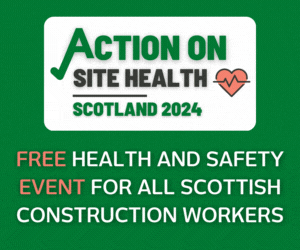Planning authorities asked to support ‘reasonable’ extensions to construction site working hours
The Scottish Government has asked planning authorities to be pragmatic in allowing requests to extend working hours on construction sites.

In a new letter which outlines how the Scottish Government has worked to tackle planning issues in light of the coronavirus restrictions, planning minister Kevin Stewart and chief planner John McNairney said they are aware that discussions are underway between some developers and planning authorities about the potential to expand the hours of operation of construction sites once they are able to re-commence work.
They outline that the need for safe working and physical distancing – on-site, in the wider community through travel to and from sites, and in allowing a spread of working patterns throughout the day – will likely necessitate some different working arrangements while restrictions continue.
“Planning authorities should be supportive of reasonable changes and requests to extend working hours,” the letter states.
It adds: “The circumstances may differ between construction sites, for example due to the nature of some operations and their locations. We could not set a national standard that would apply to every construction site; rather there will normally be a need for use of judgement in relation to the positive benefits of carrying out and completing development alongside any potential public health implications.
“Nevertheless, in most circumstances it will be reasonable to be able to extend working hours from 7am through to 9pm, Monday to Saturday; therefore such requests should not be refused unless there are compelling reasons to do so. Depending on the nature of the works and the surrounding area, much longer site operation times may be acceptable, including up to 24 hour working.
“Not all aspects of construction activity have the same impacts, and so in some cases it might be helpful to agree appropriate parameters that can enable overall working times to be extended; for example by agreeing to limit particularly loud operations, considering any proximity to noise sensitive receptors, perhaps between 9am and 5pm or another period, or ensuring noise mitigation measures into the extended working times.
“We recommend proactive, early and swift discussions between developers and planning authorities, to allow for reasonable site management that allows development to progress, recognising the current circumstances and restrictions in place.
“We remain committed to avoiding additional pressures on the planning system at this time. In most cases, we expect that agreement to temporarily extend hours of operation can be reached informally, without the need for an application process. There could be some exceptions to that default, for example if the extension sought is substantial, or would have a significant impact at a sensitive location; although planning authorities and developers should still work to achieve agreement informally where possible.”
The letter also provides a brief summary of the legislative changes and less formal revisions to practice; all taking a pragmatic view of what needed to be done to allow planning to continue during this period.
Beyond these matters, the letter updates and highlights a few further specific points about the continued functioning of the planning system, namely:
- Site visits for a planning purpose
- Planning committees and local review bodies
- Engaging with community councils
- Registration of section 75 agreements
- Supporting the recovery
- Changing business practices during physical distancing restrictions
- Safer public places
- Digital planning
- National Planning Framework 4
A second letter provides informal advice on development planning in the period ahead of the National Planning Framework 4 (NPF4) and new system of local development plans emerging.
The NPF4 timeline has been extended, with the draft now expected to be laid in the Scottish Parliament in September 2021. Ahead of this, an interim position statement on NPF4 is expected to be published this autumn and used to inform further early engagement at that stage. Subject to Parliamentary timetabling, it is anticipated this will result in Scottish Ministers adopting NPF4 in spring/summer of 2022.
Interim guidance has also been on consultation in local development planning to assist authorities and their stakeholders.
All planning authorities are asked to consider allowing longer timescales and more flexible arrangements for engagement in development planning in the coming months.
Authorities have also been reassured that reports setting out why a local development plan has not been reviewed within appropriate timescales will not be required by Ministers at this time.
A pragmatic approach is also expected in relation to annual housing land audits, recognising and fully adhering to the COVID-19 guidance, and accepting the limitations arising from social distancing and restrictions to site visits.
The letter reads: We hope that all interests in planning will continue to work together effectively to support development and the contribution of the construction sector to our future recovery. Planning authorities will benefit from strong communication and co-operation with their stakeholders. The Scottish Government’s ongoing liaison with the Construction Leadership Forum is providing invaluable insights on the challenges facing the construction industry as it progresses to a restart on non-essential sites in line with the route map published on 21 May 2020. We look forward to further positive discussions to help inform any additional action that ensures planning in Scotland remains relevant, responsive and agile in the months ahead.
“We recognise and appreciate the positive response planning authorities have made to adapt service delivery and to provide assistance in challenging times. We have an opportunity to learn from that and use it to our advantage in continuing to pursue planning reform. As part of this, our work on National Planning Framework 4 will continue to progress over the coming year. We would encourage all stakeholders to continue to play a positive and active role in this work.
“For the longer term, there are lessons emerging from the pandemic about the way we live our lives and the quality of our places, which could usefully inform development planning for the future. More time will be needed to reflect on this, but we look forward to more creative thinking, innovation and debate on the implications for Scottish planning policy and practice in the months ahead.
“We trust this is helpful and would encourage you to contact officials in Planning and Architecture Division if there are further issues for the planning system arising from the current situation which should be brought to our attention.”
- Read all of our articles relating to COVID-19 here.





















